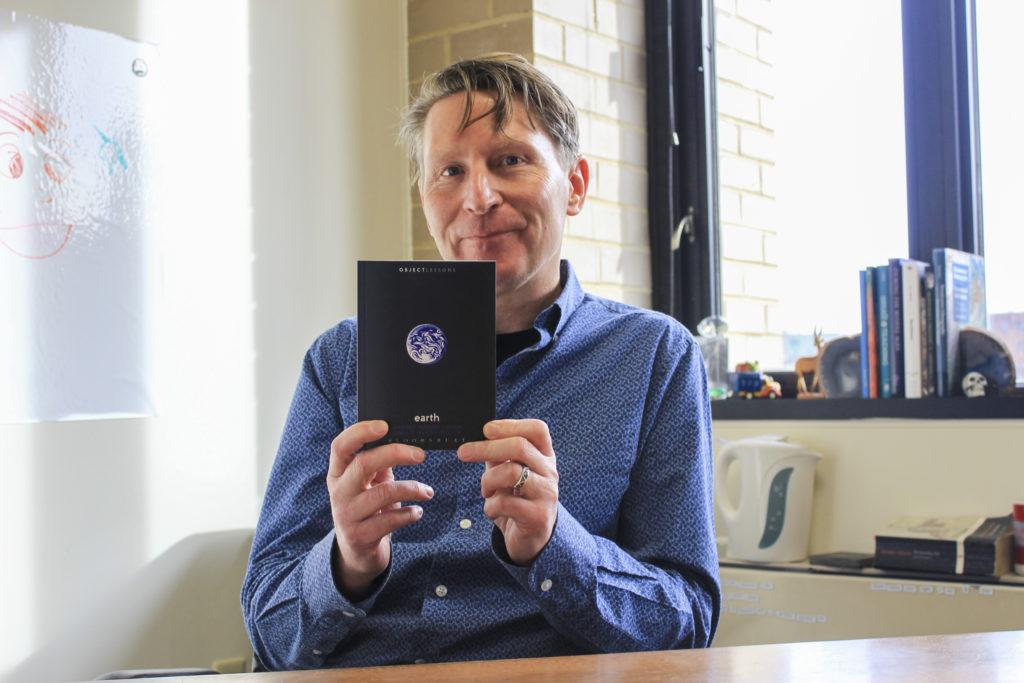English professor Jeffrey Cohen dives deeper into our understanding of our planet in his new book, “Earth.”
Cohen’s book, co-authored by planetary scientist Linda Elkins-Tanton, will be released March 9 as a part of Object Lessons, a collection of short books and essays that explores the “hidden lives of ordinary things,” according to the collection’s website. Other topics in the series include eggs, traffic, veils and refrigerators.
The book combines the humanities and science backgrounds of its two authors to discuss the planet “as an object viewable from space.” The prose covers topics like size and scale, orbit, gravity and imagination as they all relate to the planet and investigates varying perspectives on Earth throughout history.
Questions from both Elkins-Tanton and Cohen range from how the Earth got water to why, throughout history, humans have wanted to escape the forces of gravity. Elkins-Tanton bases her answers on her background in science, while Cohen challenges this logic from a philosophical and literary perspective.
Cohen, who specializes in medieval and early modern studies, was originally working on a book about stone ecology. A fellow medievalist at the Massachusetts Institute of Technology found Cohen’s project to be “weirdly similar” to that of a planetary scientist he knew, and introduced Cohen to Linda Elkins-Tanton, the director of the School of Earth and Space Exploration at Arizona State University.
With their book, Cohen said he and Elkins-Tanton wanted to encourage people to look at Earth from a new perspective and understand it outside the context of humanity.
“I think we came to the conclusion that much of the problem of thinking about the Earth is the problem humans have of thinking outside of the human scale,” Cohen said. “It’s really tough to think outside of durations that exceed human lives, or spaces that exceed human measures.”
Cohen holds a dean’s research chair, an award through the Columbian College of Arts and Sciences that allows recipients to take off from one course per year for three years to conduct research or outside projects. Cohen used the award to travel and other costs while writing “Earth.”
Cohen and Elkins-Tanton began the writing process in separate locations, writing letters back and forth. Some of the original letters made it into the book, and include personal anecdotes like Cohen’s son departing for college and Elkin-Tanton’s battle with ovarian cancer. She learned that she was in remission while writing the letters.
Elkins-Tanton said she enjoyed crafting the book from a series of letters and instant messages, which are a peek into their conversations, sharing their own research and experiences.
“This book was the greatest pleasure to write,” Elkins-Tanton said. “We truly wrote it as letters back and forth to each other, so much of the research was internal.”
Cohen spent a week with Elkins-Tanton in Arizona when working on the book. During this time, they went on long walks in the desert discussing ideas for “Earth.”
“We had an hours-long conversation about science, humanity, beauty, philosophy, which I recorded on my iPhone as we walked, and later transcribed in part for the book,” Elkins-Tanton said. “Clear and stylish conversation from a different point of view is among the most inspiring of activities, and that’s what writing this whole book was like.”
Cohen said that although he and Elkins-Tanton differ in their disciplinary backgrounds, they are “united” in their sense of curiosity. Cohen added that he and Elkins-Tanton hope “Earth” will start a much needed conversation about environmental crises.
“It seemed like a good confluence for us to be able to bring this book together as an exchange in conversation, especially at a time of so much environmental degradation and of people not respecting the Earth, of using it only for resources,” Cohen said. “I am really interested in what stories from the past have to tell us about ecological crises now and the ways in which sometimes they offer more positive, affirmative, just or humane models for thinking about what happens during times of catastrophe.”
Cohen said the book should combat what he calls an “era of anti-intellectualism,” demonstrated by the anti-science, anti-environment sentiment in President Donald Trump’s rhetoric.
“We feel like this kind of writing is what we need right now in the United States – especially in a time of growing anti-intellectualism,” Cohen said. “We need people writing smart books.”





